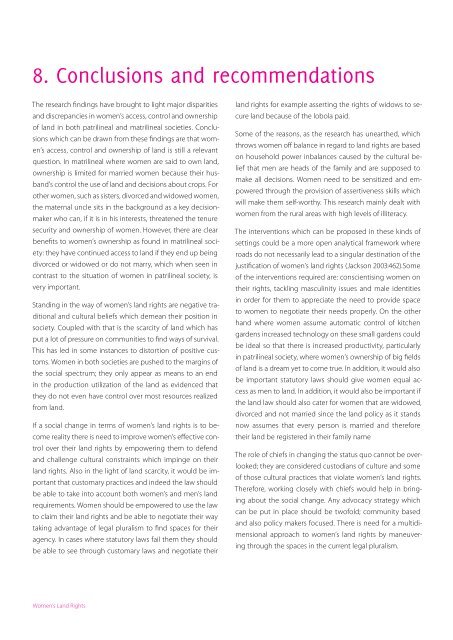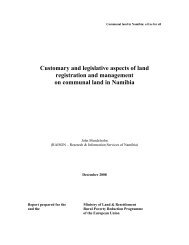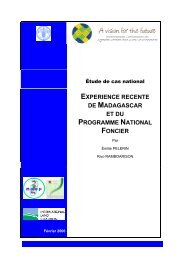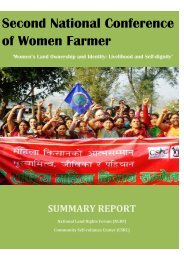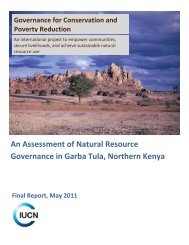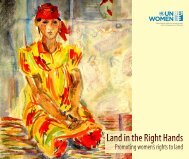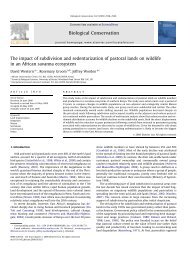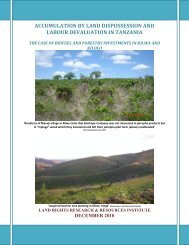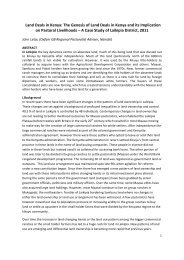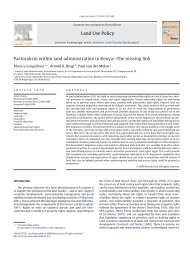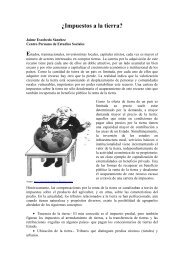Women's access to land and household bargaining power
Women's access to land and household bargaining power
Women's access to land and household bargaining power
You also want an ePaper? Increase the reach of your titles
YUMPU automatically turns print PDFs into web optimized ePapers that Google loves.
8. Conclusions <strong>and</strong> recommendations<br />
The research findings have brought <strong>to</strong> light major disparities<br />
<strong>and</strong> discrepancies in women’s <strong>access</strong>, control <strong>and</strong> ownership<br />
of <strong>l<strong>and</strong></strong> in both patrilineal <strong>and</strong> matrilineal societies. Conclu-<br />
sions which can be drawn from these findings are that wom-<br />
en’s <strong>access</strong>, control <strong>and</strong> ownership of <strong>l<strong>and</strong></strong> is still a relevant<br />
question. In matrilineal where women are said <strong>to</strong> own <strong>l<strong>and</strong></strong>,<br />
ownership is limited for married women because their husb<strong>and</strong>’s<br />
control the use of <strong>l<strong>and</strong></strong> <strong>and</strong> decisions about crops. For<br />
other women, such as sisters, divorced <strong>and</strong> widowed women,<br />
the maternal uncle sits in the background as a key decisionmaker<br />
who can, if it is in his interests, threatened the tenure<br />
security <strong>and</strong> ownership of women. However, there are clear<br />
benefits <strong>to</strong> women’s ownership as found in matrilineal society:<br />
they have continued <strong>access</strong> <strong>to</strong> <strong>l<strong>and</strong></strong> if they end up being<br />
divorced or widowed or do not marry, which when seen in<br />
contrast <strong>to</strong> the situation of women in patrilineal society, is<br />
very important.<br />
St<strong>and</strong>ing in the way of women’s <strong>l<strong>and</strong></strong> rights are negative traditional<br />
<strong>and</strong> cultural beliefs which demean their position in<br />
society. Coupled with that is the scarcity of <strong>l<strong>and</strong></strong> which has<br />
put a lot of pressure on communities <strong>to</strong> find ways of survival.<br />
This has led in some instances <strong>to</strong> dis<strong>to</strong>rtion of positive cus<strong>to</strong>ms.<br />
Women in both societies are pushed <strong>to</strong> the margins of<br />
the social spectrum; they only appear as means <strong>to</strong> an end<br />
in the production utilization of the <strong>l<strong>and</strong></strong> as evidenced that<br />
they do not even have control over most resources realized<br />
from <strong>l<strong>and</strong></strong>.<br />
If a social change in terms of women’s <strong>l<strong>and</strong></strong> rights is <strong>to</strong> become<br />
reality there is need <strong>to</strong> improve women’s effective control<br />
over their <strong>l<strong>and</strong></strong> rights by em<strong>power</strong>ing them <strong>to</strong> defend<br />
<strong>and</strong> challenge cultural constraints which impinge on their<br />
<strong>l<strong>and</strong></strong> rights. Also in the light of <strong>l<strong>and</strong></strong> scarcity, it would be important<br />
that cus<strong>to</strong>mary practices <strong>and</strong> indeed the law should<br />
be able <strong>to</strong> take in<strong>to</strong> account both women’s <strong>and</strong> men’s <strong>l<strong>and</strong></strong><br />
requirements. Women should be em<strong>power</strong>ed <strong>to</strong> use the law<br />
<strong>to</strong> claim their <strong>l<strong>and</strong></strong> rights <strong>and</strong> be able <strong>to</strong> negotiate their way<br />
taking advantage of legal pluralism <strong>to</strong> find spaces for their<br />
agency. In cases where statu<strong>to</strong>ry laws fail them they should<br />
be able <strong>to</strong> see through cus<strong>to</strong>mary laws <strong>and</strong> negotiate their<br />
Women’s L<strong>and</strong> Rights<br />
<strong>l<strong>and</strong></strong> rights for example asserting the rights of widows <strong>to</strong> secure<br />
<strong>l<strong>and</strong></strong> because of the lobola paid.<br />
Some of the reasons, as the research has unearthed, which<br />
throws women off balance in regard <strong>to</strong> <strong>l<strong>and</strong></strong> rights are based<br />
on <strong>household</strong> <strong>power</strong> inbalances caused by the cultural belief<br />
that men are heads of the family <strong>and</strong> are supposed <strong>to</strong><br />
make all decisions. Women need <strong>to</strong> be sensitized <strong>and</strong> em<strong>power</strong>ed<br />
through the provision of assertiveness skills which<br />
will make them self-worthy. This research mainly dealt with<br />
women from the rural areas with high levels of illiteracy.<br />
The interventions which can be proposed in these kinds of<br />
settings could be a more open analytical framework where<br />
roads do not necessarily lead <strong>to</strong> a singular destination of the<br />
justification of women’s <strong>l<strong>and</strong></strong> rights (Jackson 2003:462).Some<br />
of the interventions required are: conscientising women on<br />
their rights, tackling masculinity issues <strong>and</strong> male identities<br />
in order for them <strong>to</strong> appreciate the need <strong>to</strong> provide space<br />
<strong>to</strong> women <strong>to</strong> negotiate their needs properly. On the other<br />
h<strong>and</strong> where women assume au<strong>to</strong>matic control of kitchen<br />
gardens increased technology on these small gardens could<br />
be ideal so that there is increased productivity, particularly<br />
in patrilineal society, where women’s ownership of big fields<br />
of <strong>l<strong>and</strong></strong> is a dream yet <strong>to</strong> come true. In addition, it would also<br />
be important statu<strong>to</strong>ry laws should give women equal <strong>access</strong><br />
as men <strong>to</strong> <strong>l<strong>and</strong></strong>. In addition, it would also be important if<br />
the <strong>l<strong>and</strong></strong> law should also cater for women that are widowed,<br />
divorced <strong>and</strong> not married since the <strong>l<strong>and</strong></strong> policy as it st<strong>and</strong>s<br />
now assumes that every person is married <strong>and</strong> therefore<br />
their <strong>l<strong>and</strong></strong> be registered in their family name<br />
The role of chiefs in changing the status quo cannot be overlooked;<br />
they are considered cus<strong>to</strong>dians of culture <strong>and</strong> some<br />
of those cultural practices that violate women’s <strong>l<strong>and</strong></strong> rights.<br />
Therefore, working closely with chiefs would help in bringing<br />
about the social change. Any advocacy strategy which<br />
can be put in place should be twofold; community based<br />
<strong>and</strong> also policy makers focused. There is need for a multidimensional<br />
approach <strong>to</strong> women’s <strong>l<strong>and</strong></strong> rights by maneuvering<br />
through the spaces in the current legal pluralism.


